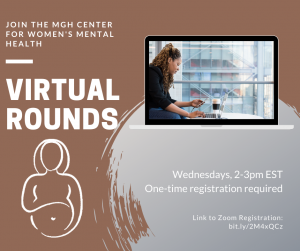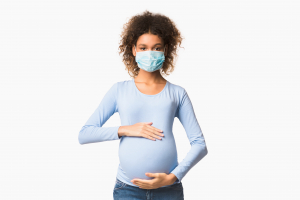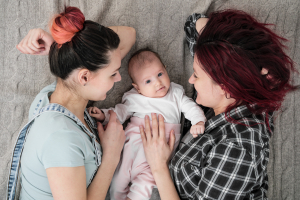Well, it’s been a year like no other. And we are all hoping for better times in the new year. Nonetheless, as I scroll over the posts from the last year, it is clear that, despite the pandemic, the field of reproductive psychiatry has continued to expand rapidly, with an unprecedented number of papers published in 2020. At the MGH Center for Women’s Mental Health, we have devised new strategies for reaching and supporting patients and their providers, including new virtual course offerings and a weekly remote version of our reproductive psychiatry clinical rounds.
Our website continues to grow. We added about 200 new blog posts in 2020 and attracted 1.9 million visits and a total of 3.6 million page views this year.
As always, we are grateful to our readers and those who support our work and research. We wish all of you health and happiness in the new year.
Ruta Nonacs, MD PhD
Weekly Virtual Rounds

Every Wednesday we look forward to a lively discussion, and, at a time when we are all feeling disconnected, this meeting has strengthened our connections within this community. In addition to having input from all of our faculty members, we have also had the pleasure of having a star-studded list of special guests who have lent their expertise and wisdom to our discussions:
Veerle Bergink, MD PhD – Director of the Mount Sinai Women’s Mental Health Program,
Catherine Birndorf, MD – CEO and Medical Director of the Motherhood Center of NYC
Wendy Davis, PhD PMH-C – Postpartum Support International
Paige Bellenbaum, LMSW – Founding Director of the Motherhood Center of NYC
Dvora Entin, LCSW – Private Practice, Philadelphia
Alison Hermann, MD – Director of the Payne Whitney Women’s Program, Weill Cornell Medicine
Helen Kim, MD – Co-founder and Director of the Hennepin Healthcare Mother-Baby Program
Birdie Gunyon Meyer, RN, MA, CLC – Certification Director, Past President, Postpartum Support International
Alison Reminick, MD – Medical Director of Women’s Mental Health, UC San Diego
Carly Snyder, MD – Private Practice, New York
Adele Viguera, MD MPH – Director of Research for Women’s Mental Health at the Cleveland Clinic
Lisa Weinstock, MD – New York Medical College, in Valhalla, New York
Virtual Rounds will continue into 2021. You can register HERE.
Introducing Essential Reads
In December, we announced a new feature on our website: ESSENTIAL READS. This is a kind of shortcut which allows you to find the most relevant reviews and articles in reproductive psychiatry. Each Wednesday, we add a new article to the collection. In this section of our website, we will highlight the most up-to-date articles to help guide diagnosis, clinical decision-making, and treatment options. For example, if you want to learn more about PMDD, you can simply go to ESSENTIAL READS and look at the PMDD section. As we continue to update this section in real-time, we will be able to provide a curated collection of clinically oriented, practical articles for those interested in reproductive psychiatry.
COVID-19 and Pregnant and Postpartum Women
This year has been a particularly difficult year for women who are pregnant or planning a pregnancy. Especially in the early part of the year when we knew so little about the impact of the novel coronavirus.
•Mitigating psychiatric disorder relapse in pregnancy during pandemic
•Increased Prevalence of Depression, Anxiety in Pregnant Women During the COVID Pandemic
•Resource: A Woman’s Guide to Pregnancy and the Postpartum Period During the COVID-19 Pandemic
•What About Pregnant Women and the COVID-19 Vaccine?
•COVID-19 Positive Mothers and Newborns: What Should we Recommend?
We have created a new page on our website listing various COVID-related resources for our patients and providers:
•COVID-19 Pandemic: Resources for Pregnant and Postpartum Women
Course of ADHD During Pregnancy
While we see a significant number of women with attention-deficit/hyperactivity disorder (ADHD) who are either pregnant or planning to conceive, we have had very limited information on the course of ADHD during pregnancy. A new study from the MGH Center for Women’s Mental Health is the first to prospectively follow women with ADHD during pregnancy.
•New Research from the CWMH: The Course of ADHD During Pregnancy
Zuranolone for Postpartum Depression

•More Data on the Neuroactive Steroid Zuranolone for Postpartum Depression
•Development of Zuranolone (SAGE 217) for PPD Will Move Forward
Other Neuroactive Steroids in the Pipeline
Neurosteroids, also known as neuroactive steroids, constitute a class of steroid hormones produced in the brain and endocrine tissues which can modulate neurotransmission. Animal studies have demonstrated that neurosteroids have a broad range of activities, including antidepressant, anxiolytic, sedative, analgesic, anticonvulsant, neuroprotective, and neuroproliferative effects. Brexanolone and zuranolone are neuroactive steroids derived from allopregananolone for and are effective for the treatment of postpartum depression.
Similar neurosteroids may be effective for the treatment of premenstrual dysphoric disorder (PMDD):
•Allopregnanolone Sparks Interest as New PMDD Treatment
Other neuroactive steroids are being investigated as a treatment for perimenopausal depression:
•Pilot Study of Neurosteroid Ganaxolone for Menopausal Depression
•New Research Study: Pregnenolone Neurosteroid for the Treatment of Menopausal Depression
More Data on the Reproductive Safety of Gabapentin
Although gabapentin (Neurontin) is now used in a wide variety of clinical settings — for epilepsy, pain management, anxiety, sleep disturbance – there has been relatively little information regarding its reproductive safety, until a recent study from Patorno and colleagues. Using data from the US Medicaid Analytic eXtract (MAX) dataset, a population-based study of 1,753,865 Medicaid-eligible pregnancies examined the risk of major congenital malformations associated with gabapentin exposure during the first trimester. Data collected from a total of 4,642 pregnancies with first trimester gabapentin exposure indicated no evidence of an association between gabapentin exposure during early pregnancy and overall risk of major malformations.
•Study Supporting the Reproductive Safety of Gabapentin During Pregnancy
Examining the Impact of Prenatal Antidepressant Exposure on Long-Term Outcomes in Children
In a recent study, Rommel and colleagues present a systematic review examining the long-term effects of prenatal exposure to antidepressants on physical, neurodevelopmental, and psychiatric outcomes in children 4 years of age or older, summarizing data from a total of 34 studies.
New Strategies for the Management of Menopausal Symptoms

Neurokinin receptor antagonists are a new class of medications which appear to alleviate vasomotor symptoms.
•NT-814: Neurokinin Receptor Antagonist Effective for Menopausal Vasomotor Symptoms
We are currently involved in a study looking at a derivative of the neuroactive steroid for the treatment of menopausal depression.
•New Research Study: Pregnenolone Neurosteroid for the Treatment of Menopausal Depression










Leave A Comment